
Edward Morgan Forster was an English author, best known for his novels, particularly A Room with a View (1908), Howards End (1910) and A Passage to India (1924).

A Room with a View is a 1908 novel by English writer E. M. Forster, about a young woman in the restrained culture of Edwardian-era England. Set in Italy and England, the story is both a romance and a humorous critique of English society at the beginning of the 20th century. Merchant Ivory produced an award-winning film adaptation in 1985.

Howards End is a 1992 period romantic drama film directed by James Ivory, from a screenplay written by Ruth Prawer Jhabvala based on the 1910 novel of the same name by E. M. Forster. Marking Merchant Ivory Productions' third adaptation of a Forster novel, it was the first film to be released by Sony Pictures Classics. The film's narrative explores class relations in turn-of-the-20th-century Britain, through events in the lives of the Schlegel sisters. The film starred Emma Thompson, Anthony Hopkins, Helena Bonham Carter and Vanessa Redgrave, with James Wilby, Samuel West, Jemma Redgrave and Prunella Scales in supporting roles.

The Remains of the Day is a 1989 novel by the Nobel Prize-winning British author Kazuo Ishiguro. The protagonist, Stevens, is a butler with a long record of service at Darlington Hall, a fictitious stately home near Oxford, England. In 1956, he takes a road trip to visit a former colleague, and reminisces about events at Darlington Hall in the 1920s and 1930s.
Merchant Ivory Productions is a film company founded in 1961 by producer Ismail Merchant (1936–2005) and director James Ivory. Merchant and Ivory were life and business partners from 1961 until Merchant's death in 2005. During their time together, they made 44 films. The films were for the most part produced by Merchant and directed by Ivory, and 23 of them were scripted by Ruth Prawer Jhabvala (1927–2013) in some capacity. The films were often based upon novels or short stories, particularly the work of Henry James, E. M. Forster, and Jhabvala herself.

Ruth Prawer Jhabvala was a British and American novelist and screenwriter. She is best known for her collaboration with Merchant Ivory Productions, made up of film director James Ivory and producer Ismail Merchant.

Pride and Prejudice is a six-episode 1995 British television drama, adapted by Andrew Davies from Jane Austen's 1813 novel of the same name. Jennifer Ehle and Colin Firth starred as Elizabeth Bennet and Fitzwilliam Darcy, respectively. Produced by Sue Birtwistle and directed by Simon Langton, the serial was a BBC production with additional funding from the American A&E Network. BBC1 originally broadcast the 55-minute episodes from 24 September to 29 October 1995. The A&E Network aired the series in double episodes on three consecutive nights beginning 14 January 1996.
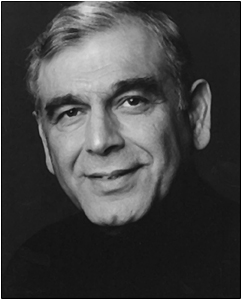
Ismail Merchant was an Indian film producer. He worked for many years in collaboration with Merchant Ivory Productions which included film director James Ivory as well as screenwriter Ruth Prawer Jhabvala. Together they made acclaimed film adaptations from the novels of E.M. Forster and Henry James. Merchant received the BAFTA Award for Best Film for A Room with a View (1985), and Howards End (1992). He received Academy Award nominations for Best Live Action Short Film for The Creation of a Woman (1959) and for Best Picture for A Room with a View (1985), Howards End (1992), and The Remains of the Day (1993).

A pension is a type of guest house or boarding house. This term is typically used in Continental European countries, in areas of North Africa and the Middle East that formerly had large European expatriate populations, and in some parts of South America, such as Brazil and Paraguay. Pensions can also be found in South Korea, Japan, and the Philippines.
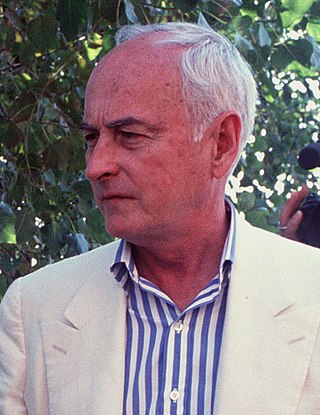
James Francis Ivory is an American film director, producer, and screenwriter. Ivory along with Indian film producer Ismail Merchant, his domestic as well as professional partner, and screenwriter Ruth Prawer Jhabvala, were the principals in Merchant Ivory Productions. Together they made acclaimed film adaptations from the novels of E.M. Forster and Henry James. Their body of work is celebrated for its elegance, sophistication, literary fidelity, strong performances, as well as its complex themes and rich characters.
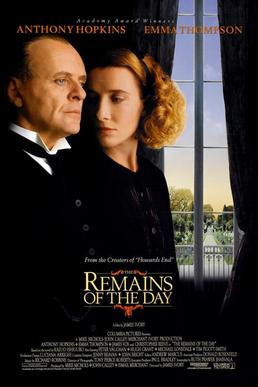
The Remains of the Day is a 1993 drama film adapted from the Booker Prize-winning 1989 novel of the same name by Kazuo Ishiguro. The film was directed by James Ivory, produced by Ismail Merchant, Mike Nichols, and John Calley and adapted by Ruth Prawer Jhabvala. It stars Anthony Hopkins as James Stevens and Emma Thompson as Miss Kenton, with James Fox, Christopher Reeve, Hugh Grant, Ben Chaplin, and Lena Headey in supporting roles.

Liberation is the second album by Northern Irish chamber pop band the Divine Comedy, released on 18 August 1993 by Setanta Records. Following the unsuccessful Fanfare for the Comic Muse, the group started improvising on their new album which was recorded in Fundamental, London in March 1993. Although it was the band's second album, the band's leader, Neil Hannon, often refers to it as the first, due to the stylistic differences from their debut album, Fanfare for the Comic Muse.

Maurice is a 1987 British romantic drama film directed by James Ivory, based on the 1971 novel Maurice by E. M. Forster. The film stars James Wilby as Maurice, Hugh Grant as Clive and Rupert Graves as Alec. The supporting cast includes Denholm Elliott as Dr Barry, Simon Callow as Mr Ducie, Billie Whitelaw as Mrs Hall, and Ben Kingsley as Lasker-Jones.
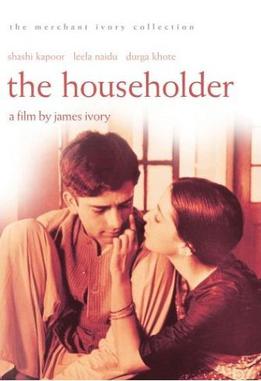
The Householder is a 1963 film by Merchant Ivory Productions, with a screenplay by Ruth Prawer Jhabvala and James Ivory, and direction of James Ivory. It is based upon the 1960 novel of the same name by Jhabvala.

Pygmalion is a 1938 British film based on the 1913 George Bernard Shaw play of the same name, and adapted by him for the screen. It stars Leslie Howard as Professor Henry Higgins and Wendy Hiller as Eliza Doolittle.
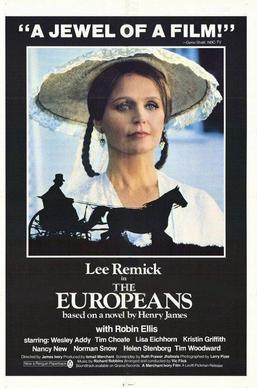
The Europeans is a 1979 British Merchant Ivory film, directed by James Ivory, produced by Ismail Merchant, and with a screenplay by Ruth Prawer Jhabvala, based on Henry James's novel The Europeans (1878). It stars Lee Remick, Robin Ellis, Tim Woodward and Lisa Eichhorn. It was the first of Merchant Ivory's triptych of Henry James adaptations. It was followed by The Bostonians in 1984 and The Golden Bowl in 2001.

Heat and Dust is a 1983 British historical romantic drama film, with a screenplay by Ruth Prawer Jhabvala based on her novel, Heat and Dust (1975). It was directed by James Ivory and produced by Ismail Merchant. It stars Greta Scacchi, Shashi Kapoor and Julie Christie.

Stiff Upper Lips is a 1997 film directed by Gary Sinyor and starring Sean Pertwee, Georgina Cates, Robert Portal, Samuel West, Prunella Scales, Peter Ustinov, and Brian Glover in his final film role. It is a broad parody of British period films, especially the lavish Merchant Ivory productions of the 1980s and early 1990s. Although it specifically targets A Room with a View, Chariots of Fire, Maurice, A Passage to India, and many other films, in a more general way Stiff Upper Lips satirises popular perceptions of certain Edwardian traits: propriety, sexual repression, xenophobia, and class snobbery. It was filmed on location in Italy, India, and on the Isle of Man.

A Room with a View is a 2007 British drama television film directed by Nicholas Renton and written by Andrew Davies, based on E. M. Forster's 1908 novel of the same name. It was announced in 2006 and filmed in the summer of 2007. A Room with a View was broadcast on 4 November 2007, on ITV.
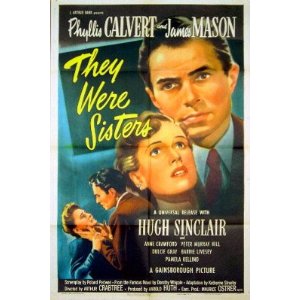
They Were Sisters is a 1945 British melodrama film directed by Arthur Crabtree for Gainsborough Pictures and starring Phyllis Calvert and James Mason. The film was produced by Harold Huth, with cinematography from Jack Cox and screenplay by Roland Pertwee. They Were Sisters is noted for its frank, unsparing depiction of marital abuse at a time when the subject was rarely discussed openly. It was one of the Gainsborough melodramas.



















